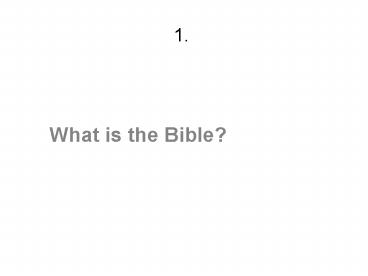What is the Bible - PowerPoint PPT Presentation
1 / 17
Title: What is the Bible
1
1.
- What is the Bible?
2
Ignorance of Christ is ignorance of
Scriptures.St. Jerome - 5th Century
3
Bible Study
- Our duty is not only to guard this precious
treasure, as if we were concerned only with
antiquity, but to dedicate ourselves with an
earnest - will and without fear to that work which our era
demands of us, pursuing thus the path which the
Church has followed for twenty centuries. - Pope John XXIII
- Opening Address
- the Second Vatican Council
4
(No Transcript)
5
(No Transcript)
6
1
- Inspiration
- Truly human authors, using their own minds
- Cooperating with the Holy Spirit
- Inerrancy
- Truth, never error
- Magisterium
- Official teaching body of the Church
- Infallibility
- Holy Father(Bishop of Rome) Pope speaks on
matters of faith and morals - religion
- means binding
- Canon
- quaneh (Hb) measuring rod
7
Language of the Bible
- The language of the Old Testament is mostly
Hebrew. There is a little Aramaic in Ezra and
Daniel. The 6 Deuterocanonical books were
written in Greek.
8
Methods of Reading Scripture
- Historical Criticism historical research
information to enhance understanding of the
Gospels - Source Criticism takes the student back to the
original sources - Form Criticism literary forms used
- Redaction Criticism- what was the particular
audience
9
Old Testament Literary Forms
- The Old Testament uses a variety of literary
techniques often found in literature. - The works of the Old Testament are full of
references to persons, places, events, and
customs from Jewish tradition. For an audience
familiar with these references, such allusions
enriched the literary texture of the Old
Testament and deepened its significance.
10
Science and the Bible
- There can be no real conflict between Bible and
scientific knowledge because GOD is the author. - Bible is biased from the Jewish point of view,
inspired by God because the Jews are His chosen
people. - Vulgate- translation into Latin by Jerome 5th
Century - Septuagint- translation of Old Testament into
Greek from Hebrew
11
What are the four basic divisions of the books
of the Old Testament?
- Pentateuch
- First 5 books- GN, EX, LV, NM. DT
- also called TORAH (HB for LAW)
- Also called Books of Moses
- Written by 4 different authors
- E- Elohist 800 BC
- J- Deuteronomist 700 BC
- Y-Yahwist 900 BC
- P-Priestly 500 BC
12
What are the four basic divisions of the books
of the Old Testament?
- Historical
- Religious history recording lives of all people
- Oldest true records which come fro Temple
findings - From the Conquest of Canaan to the restoration of
Jerusalem - Events are dated from the beginning of a Kings
reign.
13
What are the four basic divisions of the books
of the Old Testament?
- Wisdom
- A collection of poems, proverbs, wise sayings and
rules for living a true and happy life - Psalms- attributed to David
14
What are the four basic divisions of the books
of the Old Testament?
- Prophets
- Minor Prophets not much written about them
- Major Prophets more written about them
15
Deuterocanonical Books and the Apocrypha
16
Deuterocanonical Books
- The Roman Catholic canon includes seven
additional books. - These books include Judith, Tobit, Baruch, 1 2
Maccabees, Ecclesiasticus, and Wisdom. - The prefix deuteros means second. The
deuterocanonical books are the second canon.
17
Deuterocanonical Books (cont.)
- The deuterocanonical books were initially
rejected by some, including St Jerome. - St Jerome originally wanted to translate the
Latin Vulgate with only the Hebrew text. - The deuterocanonical books were not officially
added to the canon until the Council of Trent in
1545-1563.































